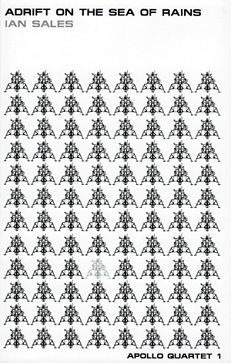
Adrift on the Sea of Rains
Ian Sales
75 pages
published in 2012
Ian Sales is a blogger and science fiction critic with strong options about what science fiction should and shouldn’t be and the conviction to put his opinions into practise. So for example, being dissatisfied with the lack of attention to women writers in science fiction and especially in the Gollancz science fiction Masterworks series, he launched the Sf Mistressworks blog to showcase overlooked classics by women writers. I don’t always agree with him, but he’s always interesting. Which is why I took a gamble on his fiction writing with Adrift on the Sea of Rains, a self published chapbook; normally something I wouldn’t bother with.
As he mentions in his biography page, Ian Sales was only three years old when Neil Armstrong set foot on the Moon, but it clearly left a deep impression nonetheless. It makes him about a decade older than myself, of the right age to be impressed by the seeming inevitability of nuclear war in the late seventies and early eighties, a Third World War that like the first seemed destined to be stumbled into rather than actively desired, all the more difficult to stop because of this. Somewhere in the mid-seventies we crossed the threshold where any nuclear war could still be survivable and reached the point where it just meant the end of the world. That was also the point at which the space race, the symbol of early Cold War machismo, ended, not in victory or defeat, but in a stalemate. The link between a better space programme and nuclear war is an old one in science fiction, as writers like Jerry Pournelle or Ben Bova, both in their fiction and outside it, arguing that space was vital for American national security, honest enough to understand that the space programme they wanted was only possible this way. Adrift on the Sea of Rains shows what could’ve happened had they been right, a story of nine astronauts in the US moonbase, left adrift after nuclear war destroyed the world.
No Comments